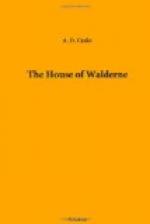Grimbeard was fairly puzzled.
“Thou hast me on the hip, youngster.”
After this conversation Martin was so fatigued by the day’s walk and all the subsequent excitement, that his mother prepared for him a composing draught from the herbs of the wood, and made him drink it and go to bed; a sweet bed of fragrant leaves and coverlets of skins in one of the huts, where she lodged her dear boy, her recovered treasure—happy mother.
The following morning, overcome by the emotions of the preceding day, Martin slept long. He was dreaming of the battle of Senlac, where he was heading a charge, when he awoke to find that the sounds of real present strife had put Senlac into his head.
He sat upright, a confused dream of fighting and struggling still lingering in his distracted mind. No, it was no dream; he heard the actual cry of those who strove for mastery: the exulting yell:
“Englishmen, on! down, ye French tyrants!”
“Out! out! ye English thieves!”
“Saint Denys! on, on! Saint Michael, shield us!”
Then came the sound of fiercer strife, the cry of deadlier anguish.
For there with arrow, spear, and knife,
Men fought the desperate fight for life.
Martin slipped on his garb, and hurried to the scene. He looked, gained a sloping bank, and there—
That morning, a merry young knight and his train set out from Herstmonceux Castle to go “a hunting,” and in the very exuberance of his spirits, like Douglas of old, he thought fit to hunt in the woods haunted by the “merrie men,” as he in the Percy’s country. Such a merry young knight, such a roguish eye.
But he had not ridden far into the debatable land when the path lay between two sloping, almost precipitous banks, crowned with underwood. All at once a voice cried:
“Stand! Who are ye? Whence come ye? What do ye here in the woods which free Englishmen claim as their own?”
A shaggy form, a bull-like individual, stood above them. The young knight gazed upon his interlocutor with a comic eye.
“Why, I am Ralph of Herstmonceux, an unworthy aspirant to the honours of chivalry, and conceive I have full right to hunt in the Andredsweald without asking leave of any king of the vagabonds and outlaws, such as I conceive thee to be.”
“Cease thy foolery, thou Norman magpie.
“Throw down your arms, all of you. Our bows are bent; you are in our power. You are covered, one and all, by our aim.”
“Bring on your merrie men.”
Not one of the waylaid party had put arrow to bow. This may seem strange, but they had sense enough to know (as the reader may guess), that the first demonstration of hostility would bring a shower of arrows from an unseen foe upon them. That, in short, their lives were in the power of the “merrie men,” whose arrowheads and caps they could alone see peering from behind the tree trunks, and over the bank, amidst the purple heather.




